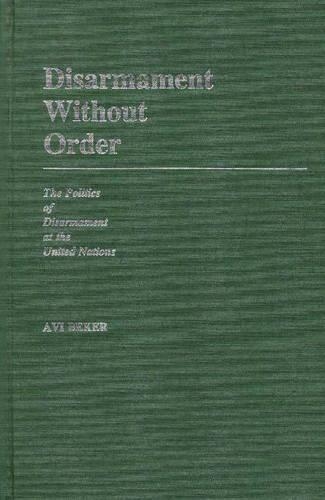
Disarmament Without Order: The Politics of Disarmament at the United Nations
(Hardback)
Publishing Details
Disarmament Without Order: The Politics of Disarmament at the United Nations
By (Author) Avi Beker
Bloomsbury Publishing PLC
Praeger Publishers Inc
21st May 1985
United States
Classifications
Tertiary Education
Non Fiction
International institutions / intergovernmental organizations
327.174
Physical Properties
Hardback
212
Reviews
Beker presents a lively account of the major issues in arms control and disarmament surfacing in the UN during the post-1945 period. The book's major thesis, that mechanisms of the UN have been handicapped in their grappling with arms control and thus have failed to produce efficient weapons regulations, is well argued and reasonably well supported. Other minor theses are also convincingly set out: that disarmament cannot be relied upon to generate a redistribution of funds for international economic development; that UN member states including the superpowers have been unwilling to alter the international system of nation-states simply to increase the chances for successful disarmament; that given the conventional arms trade upsurge, the Third World may not be the most self-evident engineer of arms control measures at the UN. Beker's contribution to the literature lies in these arguments and in numerous perceptive observations.... Beker does the reader a service by providing a selection of provocative quotations and a broad survey of UN resolutions relevant to arms control in an easily accessible format. His cogent argument questions the dynamics of international political change and the use of arms control, disarmament, and security. Lower division through graduate collections.-Choice
"Beker presents a lively account of the major issues in arms control and disarmament surfacing in the UN during the post-1945 period. The book's major thesis, that mechanisms of the UN have been handicapped in their grappling with arms control and thus have failed to produce efficient weapons regulations, is well argued and reasonably well supported. Other minor theses are also convincingly set out: that disarmament cannot be relied upon to generate a redistribution of funds for international economic development; that UN member states including the superpowers have been unwilling to alter the international system of nation-states simply to increase the chances for successful disarmament; that given the conventional arms trade upsurge, the Third World may not be the most self-evident engineer of arms control measures at the UN. Beker's contribution to the literature lies in these arguments and in numerous perceptive observations.... Beker does the reader a service by providing a selection of provocative quotations and a broad survey of UN resolutions relevant to arms control in an easily accessible format. His cogent argument questions the dynamics of international political change and the use of arms control, disarmament, and security. Lower division through graduate collections."-Choice
Author Bio
ker /f Avi
